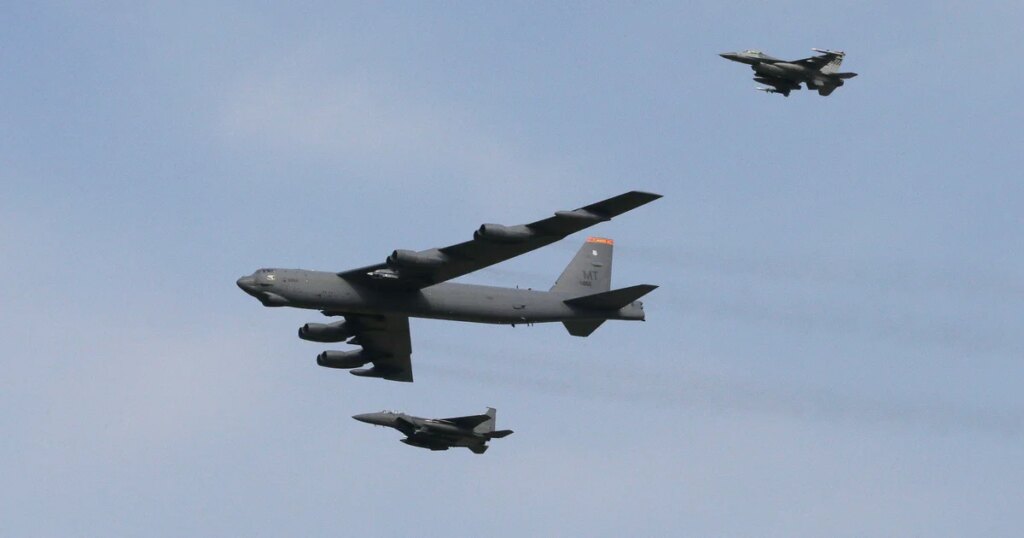On Wednesday, the U.S. military deployed three B-52 bombers on missions near the Venezuelan coast, signaling a significant escalation in military activity in the region. This move comes amid ongoing tensions between the U.S. and Venezuelan President Nicolás Maduro, particularly in light of U.S. allegations that Maduro has connections with drug trafficking organizations. The Trump administration has ramped up its military presence in the Caribbean, involving multiple warships, aircraft, and approximately 10,000 troops in a concerted effort to exert pressure on the Maduro government.
| Article Subheadings |
|---|
| 1) Military Operations Near Venezuela |
| 2) The B-52 and Its Capabilities |
| 3) Escalating Tensions and Military Build-Up |
| 4) U.S. Policy on Drug Trafficking |
| 5) Reactions and Implications |
Military Operations Near Venezuela
The recent deployment of three B-52 bombers represents a tactical maneuver by the U.S. military as tensions rise between the U.S. and the Venezuelan government. This operation was confirmed by a spokesperson from the Global Strike Command and a U.S. official. The bombers were observed circling in the Caribbean Sea, approximately 150 miles north of Venezuela, as tracked by flight data from Flightradar24. Such military exercises highlight the U.S. government’s strategy of demonstrating its military capabilities in the region.
The B-52 and Its Capabilities
The B-52 Stratofortress is a long-range, subsonic, jet-powered strategic bomber capable of carrying both conventional and nuclear weapons. The Air Force has noted its extensive use in various conflicts, including the wars in Iraq and Afghanistan. The presence of this aircraft indicates not only a show of force but also an underlying strategic objective, allowing the U.S. to rapidly project power in regions of emerging conflict.
Escalating Tensions and Military Build-Up
The deployment of the B-52 bombers follows a considerable increase in military resources in the Caribbean. Under the Trump administration, eight warships, a nuclear-powered submarine, and several fighter jets have been stationed in the area. Reports indicate that approximately 10,000 U.S. personnel are deployed either on naval vessels or in Puerto Rico, representing a substantial military presence aimed at curbing Venezuelan activities.
Additionally, U.S. military operations have included airstrikes targeting alleged drug-trafficking boats operating near Venezuela. According to officials, these missions aim to target vessels contributing to drug cartels, reinforcing the administration’s hardline stance on narcotics coming from South American countries. These escalated military operations align with a broader strategy to curb the influence of Maduro’s government in the region.
U.S. Policy on Drug Trafficking
The Trump administration has taken a staunch position against drug trafficking, linking Maduro’s regime to various cartels and criminal organizations. President Trump has openly stated that his administration is willing to support covert CIA operations within Venezuela and may consider land-based strikes against drug traffickers. This authoritative approach aims to undermine the Venezuelan government’s stability and reducing its alleged ties to organized crime.
In light of these operations, Trump mentioned during a press conference that he has authorized various covert activities in Venezuela. While discussions about the authority of the CIA to act against Maduro remain contentious, the overall objective is aligned with a broader narrative of combatting organized crime and restoring order in the region.
Reactions and Implications
The military actions taken by the U.S. have not gone unnoticed domestically or internationally. On one hand, the Trump administration maintains that congressional authorization is not necessary, citing ongoing armed conflict with drug trafficking entities. On the other hand, there has been pushback from both Democratic and some Republican lawmakers, arguing that more evidence is needed to justify military actions and that congressional approval should be sought before further operations.
Moreover, the administration’s claims regarding the legitimacy and necessity of its military operations have drawn criticism from international observers. As the U.S. continues to assert that it does not require permission to intervene in Venezuela, the geopolitical implications of such decisions are profound, potentially setting a precedent for military involvement in South American sovereign affairs.
| No. | Key Points |
|---|---|
| 1 | Three B-52 bombers were deployed near Venezuela as part of military operations. |
| 2 | The B-52 is capable of carrying conventional and nuclear weapons. |
| 3 | The U.S. has amassed 10,000 troops in the Caribbean amidst rising tensions. |
| 4 | The administration is linked military actions to combating drug trafficking. |
| 5 | Domestic pushback raises questions regarding congressional authority for military actions. |
Summary
The escalation of military activity near Venezuela, including the deployment of B-52 bombers and the increase in U.S. troops in the Caribbean, reflects a growing U.S. strategy to confront the Maduro administration and address drug trafficking concerns. With significant military and diplomatic implications, these actions underscore the complex relationship between the U.S. and Venezuela, as the situation continues to evolve in a highly charged geopolitical landscape.
Frequently Asked Questions
Question: Why are B-52 bombers being deployed near Venezuela?
The deployment is part of a U.S. military strategy to exert pressure on the Venezuelan government amid rising tensions and to confront issues related to drug trafficking.
Question: What capabilities do B-52 bombers possess?
B-52 bombers are long-range, jet-powered strategic bombers capable of carrying conventional and nuclear weapons, making them versatile in various military operations.
Question: What concerns have been raised regarding U.S. military operations?
There have been calls for congressional approval of military actions, with lawmakers questioning the justification for strikes on alleged drug trafficking boats and the administration’s claims of needing no authorization.


